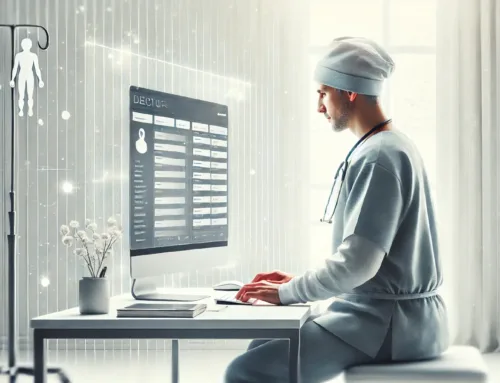When considering career prospects in medical record data entry, you might be surprised at the diverse opportunities available to you in the healthcare sector. From roles that involve hands-on transcription work to those focusing on data analysis and compliance management, the field offers a range of paths for individuals with varying skill sets and interests. Whether you are drawn to the technical aspects of software expertise or the critical role of ensuring patient data confidentiality, exploring these career options could lead you to a fulfilling and impactful career in healthcare.
Medical Transcriptionist
Medical transcriptionists play a crucial role in the healthcare industry by transcribing and documenting medical reports, dictated by healthcare professionals, into written records. Transcription accuracy is paramount in this role, as any errors could have serious consequences for patient care. Ensuring precision and attention to detail in transcribing complex medical terminology is a key responsibility of a medical transcriptionist.
Moreover, workflow optimization is essential for medical transcriptionists to handle the high volume of reports efficiently. Organizing and prioritizing tasks can help streamline the transcription process, allowing for timely completion of reports. Utilizing technology such as speech recognition software can also aid in enhancing workflow efficiency.
Electronic Health Record Manager
As an Electronic Health Record Manager, you will play a pivotal role in overseeing the implementation of EHR systems within healthcare facilities. Your responsibilities will include ensuring data accuracy management to maintain the integrity of patient information. Additionally, you will need to stay updated on compliance regulations and security measures to safeguard sensitive medical records.
EHR System Implementation
Implementing an EHR system as an Electronic Health Record Manager requires meticulous planning and coordination. One of the key challenges in EHR system implementation is ensuring a smooth transition while addressing the complexities of healthcare data management. To overcome these challenges, focus on data entry process improvements to enhance accuracy and efficiency. Implementing standardized data entry protocols and providing comprehensive training to staff can streamline the process and minimize errors. Additionally, effective communication with all stakeholders is crucial to ensure that everyone understands their roles and responsibilities during the implementation phase.
Data Accuracy Management
To excel as an Electronic Health Record Manager, proficiency in data accuracy management is paramount. Data entry accuracy and error prevention are critical aspects of your role. Ensuring the quality control of medical records through effective data validation techniques is essential to maintain the integrity and reliability of patient information. By implementing rigorous quality assurance measures, you can minimize errors in data entry and safeguard the accuracy of electronic health records.
To achieve high standards of data accuracy, it is crucial to develop systematic processes for error detection and correction. Regularly reviewing data entry practices, identifying common errors, and providing training to staff can help prevent inaccuracies from occurring. Additionally, implementing automated validation checks and audits can further enhance the accuracy of medical record data.
As an Electronic Health Record Manager, your attention to detail and commitment to error prevention will play a vital role in maintaining data accuracy and upholding the quality standards of medical record management.
Compliance and Security
Maintaining compliance and ensuring the security of electronic health records is a critical responsibility for an Electronic Health Record Manager. Data encryption techniques play a vital role in safeguarding sensitive patient information from unauthorized access. As an Electronic Health Record Manager, your expertise in implementing encryption methods such as AES or RSA is essential to protect data both at rest and in transit.
Moreover, adherence to HIPAA compliance measures is non-negotiable in the healthcare industry. Your role involves ensuring that electronic health records meet the stringent standards outlined in the Health Insurance Portability and Accountability Act. This includes implementing access controls, conducting regular security audits, and training staff on data protection protocols.
Medical Coder
Amidst the dynamic landscape of healthcare data management, the role of a Medical Coder stands as a crucial component in ensuring accurate and efficient processing of medical records. Medical coders play a vital role in translating diagnoses, procedures, and medical services into universal codes, following strict medical coding regulations to ensure consistency and compliance within the healthcare industry.
Adhering to these regulations is paramount to guaranteeing that medical records are accurately documented and that insurance claims are processed correctly. As a Medical Coder, you will need a keen eye for detail and a thorough understanding of medical terminology and classification systems.
Moreover, a career as a Medical Coder offers promising career advancement opportunities. With experience and additional certifications, such as Certified Professional Coder (CPC) credentials, you can progress to senior coding positions, auditor roles, or even management positions within healthcare organizations. Staying current with the ever-evolving coding guidelines and regulations is essential for continued professional growth in this field.
Health Information Technician
As you navigate the intricate realm of healthcare data management, the role of a Health Information Technician emerges as a pivotal element in ensuring the seamless organization and accessibility of medical records. Health Information Technicians play a crucial role in maintaining the accuracy, security, and integrity of medical records within healthcare facilities. Here are three key points to consider about this career:
- Career Advancement: Health Information Technicians have various opportunities for career advancement within the healthcare industry. With experience and additional certifications, they can progress to roles such as Health Information Manager, Clinical Data Specialist, or even transition into healthcare administration positions.
- Salary Expectations: The salary expectations for Health Information Technicians vary based on factors such as location, experience, and credentials. On average, entry-level Health Information Technicians can expect a competitive salary that increases with experience and additional certifications.
- Professional Growth: Pursuing further education, such as a bachelor’s degree in Health Information Management, can open doors to higher-paying positions and leadership roles within healthcare organizations. Additionally, staying current with industry trends and technology can enhance your professional growth in this field.
Data Quality Controller
As a Data Quality Controller in the field of medical record data entry, your role will involve implementing quality assurance measures to ensure accuracy and completeness of patient information. You will be responsible for meticulously reviewing records to ensure compliance with industry standards and regulations, maintaining data integrity and confidentiality. Your attention to detail and adherence to quality control processes will be crucial in upholding the integrity of medical records and contributing to overall patient care quality.
Quality Assurance Measures
When working as a Data Quality Controller in the field of medical record data entry, your role is crucial in ensuring the accuracy and integrity of the information being inputted. To excel in this position, you must focus on implementing quality assurance measures effectively. Here are three key aspects to consider:
- Process Improvement Strategies: Constantly seek ways to enhance data entry processes by identifying bottlenecks and inefficiencies. Implementing improvements will not only streamline operations but also contribute to higher accuracy levels.
- Training Programs: Develop and provide comprehensive training programs for data entry personnel to ensure they understand quality control procedures and error detection techniques. Well-trained staff are better equipped to maintain data integrity.
- Quality Control Procedures: Establish robust quality control procedures to detect and rectify errors promptly. Regular audits and checks are essential to uphold data accuracy standards and minimize discrepancies.
Compliance With Standards
Maintaining compliance with industry standards is paramount for a Data Quality Controller in the realm of medical record data entry. As a Data Quality Controller, your role revolves around ensuring that all data entry processes adhere to regulatory requirements set forth by governing bodies in the healthcare industry. This includes staying up-to-date with guidelines such as HIPAA to safeguard patient information and maintain confidentiality.
Your meticulous attention to detail is crucial in upholding data integrity, which involves verifying the accuracy and consistency of the information entered into medical records. By meticulously monitoring data quality and identifying discrepancies, you play a vital role in guaranteeing the reliability of medical records for healthcare providers and patients alike.
Being well-versed in industry standards and regulations allows you to implement effective quality control measures, conduct audits, and address any non-compliance issues promptly. Your commitment to compliance not only ensures the accuracy and reliability of medical records but also contributes to the overall quality of patient care.
Patient Data Manager
A vital role within the field of medical record data entry is that of the Patient Data Manager. This position involves overseeing the organization, security, and accuracy of patient data within healthcare systems. Here are three key aspects of the role:
- Data encryption strategies: Patient Data Managers are responsible for implementing robust data encryption techniques to safeguard sensitive patient information. By utilizing encryption protocols, they ensure that data remains secure and protected from unauthorized access.
- Patient data privacy measures: Upholding patient confidentiality is paramount. Patient Data Managers enforce strict privacy measures to comply with regulations such as HIPAA. They oversee access controls and audit trails to maintain the privacy and integrity of patient data.
- Electronic health record integration: Patient Data Managers work on integrating electronic health records seamlessly. They ensure that data entry automation techniques are effectively implemented to streamline processes and reduce errors in patient data management. By optimizing EHR integration, they enhance the efficiency and accuracy of healthcare information systems.
Medical Data Analyst
As a Medical Data Analyst, you will utilize advanced data analysis techniques to extract meaningful insights from vast amounts of medical information. Understanding industry demand trends will be crucial in shaping your analytical approach and making informed decisions based on the data. By staying updated on emerging technologies and best practices in data analysis, you can position yourself as a valuable asset in the healthcare field.
Data Analysis Techniques
When delving into the realm of data analysis techniques within the field of medical data analysis, one must possess a keen understanding of statistical methodologies and advanced analytical tools. Analyzing medical data requires a combination of statistical analysis and machine learning techniques to derive meaningful insights that can drive decision-making in healthcare settings. Here are three essential data analysis techniques used by medical data analysts:
- Statistical Analysis: Utilizing statistical methods such as regression analysis, hypothesis testing, and survival analysis to interpret and draw conclusions from medical datasets.
- Machine Learning Techniques: Applying algorithms like random forests, support vector machines, and neural networks to discover patterns, make predictions, and assist in diagnosing diseases based on medical data.
- Data Visualization: Creating visual representations like charts, graphs, and heatmaps to present complex medical data in a clear and understandable manner for healthcare professionals and decision-makers.
Mastering these data analysis techniques is crucial for medical data analysts to contribute effectively to improving patient outcomes and healthcare processes.
Industry Demand Trends
Moving on from understanding data analysis techniques in medical data analysis, it is important to recognize the current industry demand trends for Medical Data Analysts. The job market growth for Medical Data Analysts is projected to be strong in the coming years, with an increasing need for professionals who can interpret and manage large volumes of healthcare data. As the healthcare industry continues to emphasize data-driven decision-making, the demand for skilled analysts who can extract meaningful insights from complex datasets is on the rise.
To stay competitive in this evolving field, it is crucial for aspiring Medical Data Analysts to continuously seek skill development opportunities. This includes staying updated on the latest data analysis tools and technologies, honing statistical analysis skills, and gaining hands-on experience with data management systems. By investing in ongoing learning and professional development, individuals can position themselves as valuable assets in the job market and enhance their career prospects as Medical Data Analysts.
Confidentiality Officer
One crucial role within the realm of medical record data entry is that of the Confidentiality Officer. This position is vital in ensuring that sensitive patient information is handled with the utmost care and in compliance with legal and ethical standards. Here are three key aspects of the Confidentiality Officer role:
- Ethics Training: Confidentiality Officers undergo extensive ethics training to understand the importance of patient privacy and confidentiality. This training equips them with the knowledge and skills needed to navigate complex ethical dilemmas that may arise in the course of their work.
- Privacy Policies: It is the responsibility of Confidentiality Officers to stay up-to-date with privacy policies and regulations governing the handling of medical records. They must ensure that all data entry processes adhere to these policies to protect patient information from unauthorized access or disclosure.
- Compliance Oversight: Confidentiality Officers oversee compliance with privacy laws and regulations within the organization. They conduct regular audits, implement safeguards, and provide training to staff to maintain a secure and confidential environment for patient records.
Health Data Standard Officer
The role of a Health Data Standard Officer is pivotal in ensuring the accuracy and consistency of medical data entry processes. In this position, you are responsible for overseeing health data interoperability to facilitate seamless sharing of patient information among different healthcare systems. By adhering to industry best practices, you guarantee that data is standardized and structured in a way that allows for efficient exchange and understanding across various platforms.
As a Health Data Standard Officer, your focus on data privacy regulations is crucial in safeguarding sensitive patient information. You play a key role in ensuring compliance with legal requirements and ethical standards to protect the confidentiality of medical records. Additionally, you facilitate health information exchange by establishing protocols and guidelines for secure data sharing among healthcare providers.
Healthcare Regulation Compliance Officer
In ensuring adherence to healthcare regulations and industry standards, the role of a Healthcare Regulation Compliance Officer is paramount. As a Healthcare Regulation Compliance Officer, you play a crucial part in maintaining regulatory oversight and ensuring that healthcare practices comply with all necessary laws and guidelines. Your responsibilities include conducting compliance training for staff members to keep them up to date with the latest regulations. Here are three key aspects of the role:
- Regulatory Oversight: You are tasked with monitoring and assessing compliance with healthcare regulations to mitigate risks and ensure the organization operates within legal boundaries.
- Compliance Training: Providing ongoing training sessions to staff members on regulatory requirements and best practices is essential in maintaining a culture of compliance within the healthcare facility.
- Policy Development: Collaborating with stakeholders to develop and implement policies and procedures that align with regulatory standards, ensuring the organization’s operations are in line with industry regulations.
Data Entry Software Specialist
Specializing in data entry software, you play a critical role in ensuring the efficient and accurate input of medical records within healthcare systems. As a Data Entry Software Specialist, your focus lies in implementing data entry efficiency strategies to streamline the process of entering patient information into electronic health records. Your expertise in various software applications is essential in overcoming software integration challenges that may arise when integrating new systems or updating existing ones. By staying up-to-date with software advancements and understanding the intricacies of data entry workflows, you can optimize the input of medical records, contributing to the overall effectiveness of healthcare services. Your attention to detail and ability to troubleshoot software issues swiftly are integral to maintaining the integrity of patient data and ensuring seamless data entry operations across different departments within healthcare organizations. As a Data Entry Software Specialist, your dedication to precision and efficiency significantly impacts the quality of patient care and the smooth functioning of healthcare facilities.
Frequently Asked Questions
Can I Work From Home as a Medical Record Data Entry Professional?
Yes, you can work remotely as a medical record data entry professional. Many organizations offer training options for remote positions. Consider exploring reputable companies that align with your career goals and offer remote work opportunities.
What Are the Typical Software Programs Used in This Field?
Just like a symphony conductor guides each instrument, in medical record data entry, software programs orchestrate the data flow. To master this field, focus on training programs, job requirements, and mastering software like EPIC and Cerner.
Is There a Need for Bilingual Medical Record Data Entry Specialists?
Yes, there is a growing demand for bilingual medical record data entry specialists. Language proficiency is crucial for accurate documentation. Remote work opportunities are expanding, making this a viable career path for those with bilingual skills in the healthcare industry.
Are There Opportunities for Advancement in This Career?
Yes, in the field of medical record data entry, there are ample opportunities for advancement. By honing your skills and staying current with industry trends, you can pave the way for career growth and development.
How Does the Role of a Confidentiality Officer Differ From Other Positions?
In the realm of privacy regulations and data security, the role of a confidentiality officer stands out for its focus on ensuring compliance with legal requirements and safeguarding sensitive information, setting it apart from other positions in the organization.




